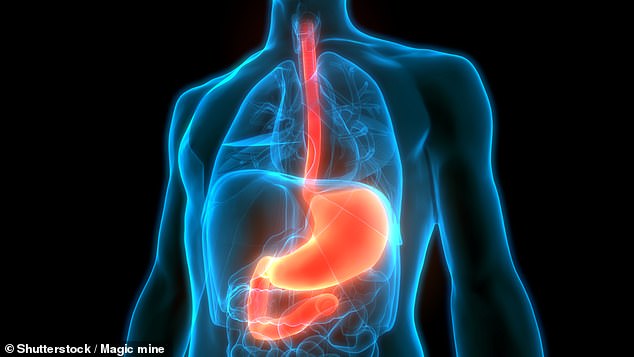New experimental pill that spots tumors YEARS before they develop could prevent a ‘death sentence’ form of cancer
A device the size of a vitamin pill could revolutionize the fight against deadly throat cancer by diagnosing patients before they develop the disease.
Patients diagnosed with esophageal cancer have only a 50 percent chance of survival even if the cancer is caught in the early stages, dropping to just six percent if the cancer is discovered at a later stage.
But the cancer — which has nearly doubled among middle-aged adults in the past five years — has been linked to a type of acid reflux that starts years in advance.
Now doctors at Lucid Diagnostics in New York City have developed a device that can detect precancerous cells in patients with acid reflux – which can then be removed before the disease develops.
The graph above shows how the breakthrough test works, which can detect cancer early
The technique involves placing a pill-like device, attached to a long thin tube, in the throat and gently moving it toward the stomach.
A small fluted balloon is then inflated and dragged up a few inches from the throat to collect cells, before the device is removed.
According to doctors, the entire process takes about two minutes and can be performed on patients who are not anesthetized.
The cells are then sent to a laboratory to test for precancerous cells that can show the risk of the disease to the patient.
Those found to have early precancerous cells are told to get screened for the cancer every three years, doctors said.
But those who have late precancerous cells – or those with more advanced mutations – are rushed for treatment to eliminate the cells.
This usually happens during an endoscopy, where high-energy radio waves are fired at the precancerous cells to destroy them.
The test can be used in patients with gastroesophageal reflux disease (GERD), doctors said, and can also be used to diagnose esophageal cancer.
This disease affects approximately 3.3 million Americans each year, although most will not develop the cancer.
About 22,000 Americans are diagnosed with the disease each year, doctors say, while 16,000 people die from the disease.
Overall, only 20 percent of patients survive more than five years after diagnosis – while of those whose cancer is diagnosed at a late stage, when it is more advanced, just six percent survive five years.
Doctors say the cancer is so deadly because it progresses quickly and is often only discovered at a later stage because the disease does not cause symptoms in its early stages.
There is no recommended screening test for the disease, but GERD patients who have damage to their esophagus are recommended to get checked every three years.
Patients with cancer are usually men over 50 years old, who may also be heavy smokers or drinkers.

The main way to detect cancer is through an endoscopy, in which a doctor inserts a long tube with a camera on the end into a person’s mouth and stomach to look for abnormalities (file photo)
Dr. Lishan Aklog said his device could help identify and treat at-risk patients before the cancer takes hold.
A study of 400 firefighters in San Francisco found the device was 90 percent accurate in diagnosing precancerous conditions.
Firefighters are at greater risk for the disease because of the chemicals they are exposed to from firefighting foam and because they are more likely to be heavy drinkers.
Once precancerous cells are diagnosed, patients may also be advised to lose weight or stop using heavy cigarettes or alcohol to reduce the risk of the cells becoming cancerous.
Doctor Aklog said Fox news: ‘If you have fluid in the stomach, the acid ends up in the lower esophagus, where it does not belong.
‘That causes cellular changes that can eventually develop into full-fledged cancer.’
The test, called EsoGuard, is now available in some states and has been granted breakthrough device status by the Food and Drug Administration (FDA).
This means that its approval has been rapid and two major studies of the test are now underway.
It only takes five minutes to perform and the lab results come back within a few weeks.
There is no information on the costs, but doctors say that for most patients they are already covered by their health insurance.
Even when esophageal cancer is diagnosed, treatment options are limited, especially in the case of more advanced cancer.
Patients may be offered surgery, chemotherapy and radiation therapy, but these often do not cure the cancer.
The test is already available in some states and has been performed tens of thousands of times, the company behind the test says.
